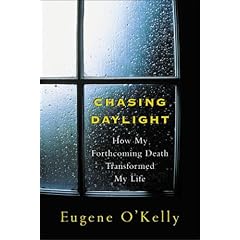In June of 2005, O'Kelly, the highly successful CEO of KPMG, one of the nation's top accounting firms, was given some bone-jarring news. The doctors told him that he had a glioblastoma, a type of cancer that uses glial cells to wage war against the healthy cells in the brain.
And the tumors where doing their work with ruthless efficiency. Neither surgery, nor chemo or radiation, would do much good. His life was just about over, the doctors told him, he had 2, maybe 3 months to live.
"Wow. Is there any way, really, to prepare for the suddenness? To have that tucked-away fear that lives constantly in all of us - that a calamity can happen, technically, at any moment - be transformed, within days or moments, into reality? To have that fear that you can bury at least sometimes, even most of the time, explode into a new state of being that you can't deny for even a second?O'Kelly pursued dying as he did living, with passion, focus, and, true to his Type A personality, a deep-seeded obsession with setting and achieving goals.
It was beyond jarring...I'd been catapulted into the last phase of my life, the one where I was supposed to be wise - wise for my daughters, my grandchildren, those younger than me. Except I'd missed a key stretch of life and still had a lot to learn.
But that was where I was. And if I was going to be of any use to my daughters, especially Gina, and to my friends and colleagues, and to Corinne, whose preternatural wisdom I'd relied on for so long, I had better get used to where I was fast."
He went immediately to work. The book documents the process of his "unwindings" and his struggle to stay clear and level-headed while fighting the ravages of his disease.
But despite the struggles, he insists that his diagnosis was actually a blessing. He was lucky in that his tumors did their work without inflicting much pain. And he adds that his sense of what's truly important and the importance of savoring perfect moments was heightened to levels most people are unable to achieve in life.
He sometimes pauses, though, to wish he had spent more days with his wife Corinne chasing daylight out on a beautiful golf course, or spent more time creating and savoring perfect moments in everyday life.
"I was just too caught up in my fast-paced, high-pressure life to ever get at the sublimeness that was embedded in them," he writes.
But ultimately, O'Kelly was succesful in meeting most of his goals during his transition. Although he went about it with an accountant's sense of focus and strict discipline, it ultimately allowed him to inject meaning into the process and create peace and a sense of closure.
Although he died in September of 2005 without finishing the book (his wife wrote the last chapter) he left this world at peace knowing he had done everything he could do. He slipped away gently on September 10th.
It's not easy to think about the end, it's much, much easier to avoid "tucked-away fears", but I think it's crucial for us to STOP and reflect on how we're living today. Eugene O'Kelly died at peace because he didn't have any great regrets and what others might have seen as a curse he saw as a gift. Wow! There's amazing lesson in that for all of us.
He accepted responsibility for his condition without lament, and did the best to live out his remaining days with love and dignity.
I highly recommend that you read this book. It's Eugene O'Kelly's gift to all of us.

No comments:
Post a Comment